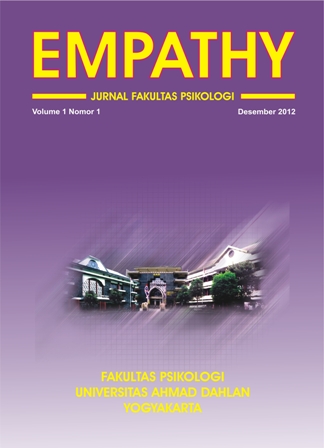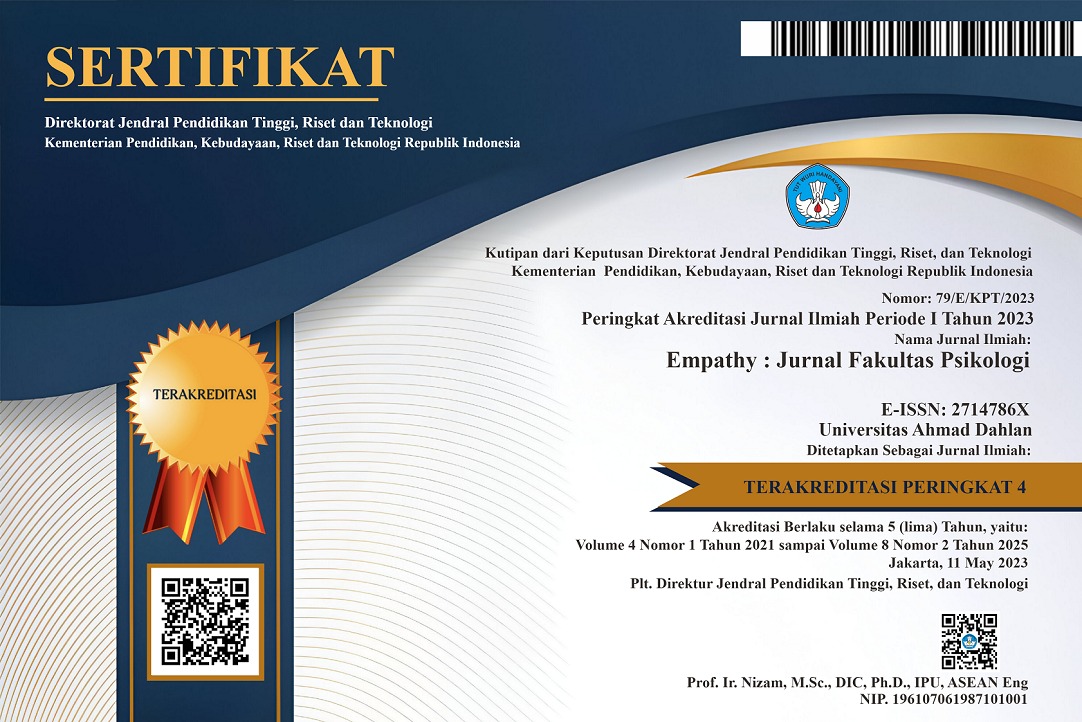Friendship quality and empathy with the happiness of new students
DOI:
https://doi.org/10.12928/empathy.v7i1.28130Keywords:
Empathy, Friendship quality, HappinessAbstract
High levels of happiness have a positive impact on students' academic continuity. This study aims to examine the relationship between friendship quality and empathy with the happiness of new students. The method used in this study is quantitative correlational, with a sample size of 368 new students. The sampling technique used is probability sampling. Three measurement tools were used: the Happiness According Scale, the Friendship Quality Scale (FQUA), and the Interpersonal Reactivity Index (IRI). Data analysis was performed using multiple linear regression. The results of the study show that there is a significant relationship between friendship quality and empathy with happiness. Individuals with good friendship quality and high empathy will experience increased happiness. Partial tests also illustrate the influence of each variable, with both friendship quality and empathy contributing to individual happiness. The conclusion of this study is that there is a significant relationship between friendship quality and empathy with the happiness of new students at Sunan Ampel State Islamic University Surabaya.
References
Ahmad, N. A., Widianti, E., & Somantri, I. (2021). Gambaran kebahagiaan pada mahasiswa keperawatan. Jurnal Keperawatan Jiwa (JKJ) Persatuan Perawat Nasional Indonesia, 9(1), 11–26. https://doi.org/10.26714/jkj.9.1.2021.11-26
Muhammad, Z., Kustiwan, Stephen, D., & Mutiara Citra, M. (2022). Konsep dan implementasi well being mahasiswa di perguruan tinggi dalam perspektif pendidikan Islam dan sekuler. https://repository.uinjkt.ac.id/dspace/handle/123456789/69812
Amalia, Y. (2019). Tingkat kebahagiaan pada mahasiswa Fakultas Kesehatan Masyarakat Universitas Airlangga PSDKU Banyuwangi. Journal of Community Mental Health and Public Policy, 1(2), 1–7. https://doi.org/10.51602/cmhp.v1i2.30
Mafaza, N., Kawuryan, F., & Pramono, R. B. (2021). Kebahagiaan mahasiswa ditinjau dari optimisme dan student engagement. Jurnal Psikologi Perseptual, 6(2), 148–159. https://doi.org/10.24176/perseptual.v6i2.6877
Putra, A. H., & Hariko, R. (2023). Studi deskriptif kebahagiaan pada mahasiswa baru. Jurnal Konseling Indonesia, 8(2), 57–62. http://ejournal.unikama.ac.id/index.php/JKI
Rianto, P., & Nashori, F. (2024). Mengelola hidup bahagia bagi mahasiswa [Managing happy life for students]. PengabdianMu: Jurnal Ilmiah Pengabdian kepada Masyarakat, 9(4), 661–669. https://doi.org/10.33084/pengabdianmu.v9i4.7054
Silva, R. G., & Figueiredo-Braga, M. (2018). Evaluation of the relationships among happiness, stress, anxiety, and depression in pharmacy students. Currents in Pharmacy Teaching and Learning, 10(7), 903–910. https://doi.org/10.1016/j.cptl.2018.04.002
Abdullah, A. (2020). Happiness Levels Among New Psychology Students at Muhammadiyah University of Malang. Indonesian Journal of Psychological Research, 8(3), 210-225. doi:10.1080/17439760.2020.1200058.
Seligman, M. E. P. (2011). Flourish: A Visionary New Understanding of Happiness and Well-being. Free Press. https://psycnet.apa.org/record/2010-25554-000
Liddiniyah, A., & Maryam, E. W. (2024). Kesamaan dan kualitas persahabatan pada mahasiswa. Personifikasi: Jurnal Ilmu Psikologi, 14(2), 102–114. https://doi.org/10.21107/personifikasi.v14i2.19276
Fitri, A. (2019). The Relationship Between Friendship Quality and Happiness in College Students. Journal of Happiness Studies, 11(3), 112-128. doi:10.1007/s10902-019-00123-6.
Hapsari, I. G., & Sholichah, M. (2020). The Correlation Between Friendship Quality and Happiness Levels in Students. Educational Psychology Journal, 15(4), 315-330. doi:10.1080/13540602.2020.1447508.
Anderson, A. R., & Fowers, B. J. (2020). An exploratory study of friendship characteristics and their relations with hedonic and eudaimonic well-being. Journal of Social and Personal Relationships, 37(1), 260–280. https://doi.org/10.1177/0265407519861152
Hapsari, I. G., & Sholichah, I. F. (2021). Framework: The effect of friendship quality and self-esteem on happiness in late teenage students. Jurnal Universitas Muhammadiyah Gresik Engineering Social Sciences and Health International Conference, 1(2), 129. https://doi.org/10.30587/umgeshic.v1i2.3378
Anderson, B., & Fowers, B. J. (2019). Friendship Quality as a Source of Happiness. Journal of Positive Psychology, 14(1), 95-105. doi:10.1080/17439760.2018.1497686.
Diener, E., Scollon, C. N., & Lucas, R. E. (2009). Assessing well-being: The collected works of Ed Diener. https://doi.org/10.1007/978-90-481-2354-4
Goleman, D. (2015). Kecerdasan emosi untuk mencapai puncak prestasi (Working with emotional intelligence). PT Gramedia Pustaka Utama. https://doi.org/IOS3659.26125
Inam, A., Faisal, A., Ali, A., Fatima, H., & Khan, S. (2021). Self-compassion and empathy as predictors of happiness among late adolescents. Social Sciences, 10(10), 380. https://doi.org/10.3390/socsci10100380
Ali, A., & Bozorgi, M. (2014). The relationship between empathy and happiness. Journal of Happiness Studies, 15(4), 761-774. https://doi.org/10.1007/s10902-013-9455-9
Sari, S. P. (2020). The influence of empathy on happiness in adolescents. Indonesian Journal of Psychology, 9(2), 89-99. https://doi.org/10.22146/jpsi.56882
Dewi, K. (2019). Positive emotions and their relation to empathy in college students. Journal of Educational Psychology, 11(3), 220-231. https://doi.org/10.1007/s10648-019-09445-1
Widyasari, N. A., Nasri, W. O. L. A., & Pardede, S. (2023). Hubungan self-acceptance dengan kebahagiaan siswa. Orien Cakrawala Ilmiah Mahasiswa, 3(1), 7-12. https://doi.org/10.30998/ocim.v3i1.8984
Sharma, B., & Parveen, A. (2021). A correlational study of friendship-quality, self-esteem, and happiness among adolescents. International Journal of Indian Psychology, 9(4). https://doi.org/10.25215/0904.161
Chandrasari, N. F. (2022). Hubungan kualitas persahabatan dan kebahagiaan mahasiswa perantau. DSpace Repository: Universitas Islam Indonesia, 1(1), 35-47. https://dspace.uii.ac.id/handle/123456789/41646
Lana, C. D., & Indrawati, K. R. (2021). Peranan kualitas persahabatan dan kecerdasan emosional pada kebahagiaan remaja. Jurnal Psikologi Udayana, 8(1), 95. https://doi.org/10.24843/jpu.2021.v08.i01.p10
Nuryanti, S. (2020). Empathy and happiness of disaster volunteers. Interaktif: Jurnal Ilmu-ilmu Sosial, 12(2), 10-21. https://interaktif.ub.ac.id/index.php/interaktif/article/view/244
Nursyahrurahmah, N. (2018). Hubungan antara kualitas persahabatan dan empati dengan kebahagiaan pada mahasiswa Bima. Jurnal Ecopsy, 5(2), 88-93. https://doi.org/10.20527/ecopsy.v5i2.5177
Nida, F. L. K. (2021). Kontribusi muhasabah dalam mengembangkan resiliensi pada orang tua anak berkebutuhan khusus. Journal An-Nafs: Kajian Penelitian Psikologi, 6(2), 244-262. https://doi.org/10.33367/psi.v6i2.1715
Huang, J., Shi, H., & Liu, W. (2018). Emotional intelligence and subjective well-being: Altruistic behavior as a mediator. Social Behavior and Personality, 46(5), 749-758. https://doi.org/10.2224/sbp.6762
Carr, A. (2004). Positive psychology: The science of happiness and human strengths. https://doi.org/10.4324/9780203156629
Sari, M. Y., & Rahmasari, D. (2022). Dukungan sosial pada mahasiswi dengan perilaku menyakiti diri. Character: Jurnal Penelitian Psikologi, 9(8), 87-98. https://doi.org/10.26740/cjpp.v9i8.50713
Ariska, D., Situmorang, N. Z., Hanif, M., & Sulistiawan, A. (2020). Makna kebahagiaan pada mahasiswa perempuan di era millennials. Psikoislamedia: Jurnal Psikologi, 5(1), 66-74. https://doi.org/10.22373/psikoislamedia.v5i1.6290
Downloads
Published
Issue
Section
License
Authors who publish with Empathy: Jurnal Fakultas Psikologi agree to the following terms:
- Authors retain copyright and grant the journal right of first publication with the work simultaneously licensed under a Creative Commons Attribution License (CC BY-SA 4.0) that allows others to share the work with an acknowledgment of the work's authorship and initial publication in this journal.
- Authors are able to enter into separate, additional contractual arrangements for the non-exclusive distribution of the journal's published version of the work (e.g., post it to an institutional repository or publish it in a book), with an acknowledgment of its initial publication in this journal.
- Authors are permitted and encouraged to post their work online (e.g., in institutional repositories or on their website) prior to and during the submission process, as it can lead to productive exchanges, as well as earlier and greater citation of published work.

This work is licensed under a Creative Commons Attribution-ShareAlike 4.0 International License.




